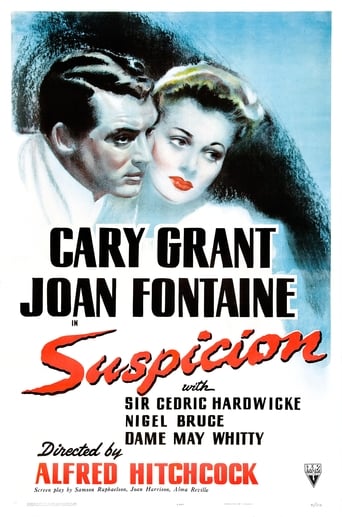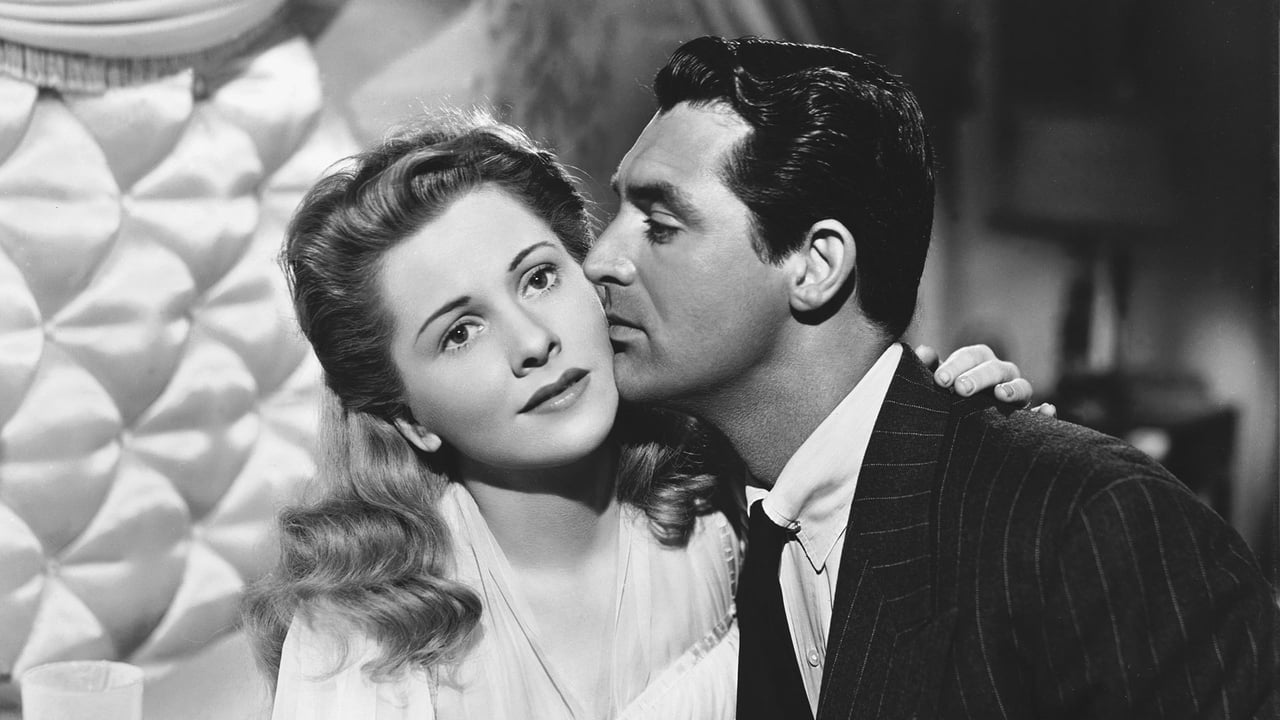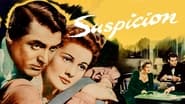JohnHowardReid
Copyright 14 November 1941 by RKO-Radio. New York opening at the Radio City Music Hall: 20 November 1941. U.S. release: 14 November 1941. Australian release: 31 December 1941. 9,135 feet. 101½ minutes.SYNOPSIS: Cad marries heiress. Cad tries to murder heiress. Does he?NOTES: The prestigious Academy of Motion Picture Arts and Sciences' Annual Award for Best Actress went to Joan Fontaine. Also nominated for Best Picture (defeated by "How Green Was My Valley"); Music Scoring of a Dramatic Picture (lost to Bernard Herrmann's "All That Money Can Buy")."Suspicion" was number 8 on The Film Daily's annual poll of U.S. film critics. (Mrs. Miniver was first, followed by How Green Was My Valley, King's Row, Wake Island, The Pride of the Yankees, The Man Who Came To Dinner, and One Foot In Heaven).The New York Film Critics voted Joan Fontaine's the Best Feminine Performance of 1941.To win her Best Actress honor, Joan Fontaine defeated her sister, Olivia de Havilland (Hold Back the Dawn), as well as Bette Davis (The Little Foxes), Greer Garson (Blossoms in the Dust), and Barbara Stanwyck (Ball of Fire)."Francis Iles" is the pseudonym of Anthony Berkeley Cox (1893-1970), who also wrote under the name, Anthony Berkeley. "Before the Fact" is generally regarded as his masterpiece. It's a great shame it was not brought intact to the screen, but ruined by a spurious ending.COMMENT: Did Joan Fontaine deserve her coveted award for "Suspicion"? Was she given the award because voters felt she had been unjustly edged out by Ginger Rogers' "Kitty Foyle" the previous year when she should have won for "Rebecca"? There's no question that "Rebecca" is the superior film in all respects. "Rebecca" is one of the finest movies of the forties. "Suspicion" is a cheap cheat.Oh, "Suspicion" is well made all right. Beautifully made in fact. The camera-work dazzles, Hitchcock pulls out all stops and the cast is a wonderful who's who of British character players. Ninety-nine percent of "Suspicion" is an absolute delight. It's unfortunate that all the atmosphere, all the suspense that has been so carefully built up, is ruined by the ending. As Hitchcock himself says: "I'm not too pleased with the way Suspicion ends. I had something else in mind. The scene I wanted, but it was never shot, was for Cary Grant to bring her a glass of milk that's been poisoned and Joan Fontaine has just finished a letter to her mother: 'Dear Mother, I'm desperately in love with him, but I don't want to live because he's a killer. Though I'd rather die, I think society should be protected from him'. Then, Cary Grant comes in with the fatal glass and she says, 'Will you mail this letter to Mother for me, dear?' She drinks the milk and dies. Fade out and fade in on one short shot: Cary Grant, whistling cheerfully, walks over to the mail¬box and pops the letter in.""Suspicion" is a fatally flawed film whichever way you look at it. My advice is to walk out just before the end. That way you can really enjoy it. And there is a lot to enjoy: Grant perfectly cast as the hollowly charming Johnnie, Fontaine (if you accept her performance at surface level) sympathetically effective, Hardwicke, Bruce and Witty contributing their usual, solidly entertaining character studies; Stradling's moodily attractive lighting; Hitchcock's tingling, suspenseful direction.
ags123
One of Hitchcock's better films from the 1940s, "Suspicion" holds up well despite its disconnection from the modern world. Maybe that's part of its appeal. It's got all the Hitchcock hallmarks - suspense, humor, glamour, sophisticated repartee, fine craftsmanship. Cary Grant is endlessly charming whether he's a hero or villain; It doesn't matter. Joan Fontaine commands the screen in a quiet, subtle way. She is lovingly photographed throughout, looking, arguably, at the peak of her beauty. The ending is highly problematic. Some viewers are okay with it. I find it awkward and stagy. It upends everything that's gone before it, blithely dismissing all that previous tension with a wordy and bogus explanation. The plot builds to a murder which never occurs. Still, "Suspicion" engages on every repeated viewing.
l_rawjalaurence
Dismissed by critics as "minor" Hitchcock, SUSPICION nonetheless has plenty to recommend it.Set in a chocolate-box English village reconstructed on the RKO back-lot, full of green fields, mock-Tudor housing, hunting scenes and over-stuffed interiors, the film contrasts the stultifying respectability of spinster Lina's (Joan Fontaine's) life with the prospects offered by chancer Johnnie (Cary Grant).Lina lives in a village world where church-going and hunt balls are the highlights of daily life. Her parents (Dame May Witty and Sir Cedric Hardwicke) spend their days in their comfortable living-room, either embroidering or reading the paper. They have no need for excitement: General McLaidlaw (Hardwicke) has enjoyed a distinguished military career and has now retired. By contrast Johnnie, although reluctant to work, as well as being a habitual liar with a penchant for betting, has that indefinable quality called charm (what else would he be, when played by Grant?) Lina understands what a worthless person he is, but cannot detach herself from him. As Johnnie's friend Beaky (Nigel Bruce) tell her, he can be excused anything.The only suggestion that something might be amiss is communicated through lighting. The two protagonists are perpetually photographed with bars - window-bars, blinds, stairwells being three example - either across their bodies or at the back of the frame, suggesting imprisonment. This is both physical as well as emotional: neither Johnnie nor Lina can be honest with one another. As a result Lina continually suspects her husband's motives.There are continual echoes of REBECCA, filmed in the previous year - not only with the presence of Fontaine in the case, but also with the use of stock footage taken on the coast from the cliffs looking down at the sea crashing below. The final sequence, where Johnnie drives his sports car at breakneck speed, putting both his own and his spouse's safety at risk, recalls a similar moment in the earlier film. The endings of the two films are different, but the intertexts remain.There is one memorable sequence towards the film's end, drawing attention to Hitchcock's penchant for the macabre. As Johnnie is abound to climb the stairs, he is photographed in shadow, picked out against a tight column of bright light. Just what his motives are, we know not; but the visual effect is stunning.
atlasmb
In "Suspicion", Hitchcock takes the audience on a ride. The story starts by mixing two seemingly incompatible people--Cary Grant as Johnnie and Joan Fontaine as Lina--and making them a couple. She is a studious, introspective, conservative woman and he is an impetuous, impertinent, immature extrovert. Their joining is the recipe for some kind of discord.Lina is the viewer's avatar in the film. Notice how the story follows her point of view. Much of the circumstantial evidence that points to Johnnie's guilt is viewed through her eyes, conveyed through her external clues to inner turmoil in a great performance by Fontaine. Note the way Hitchcock lights the interior of their home--usually with a multitude of shadows. He frames Lina with the shadows of the large window, a cage, making her a prisoner of her own love for Johnnie.The dream of happiness that was the center of their honeymoon becomes a nightmarish roller coaster ride of emotions as soon as they return home. Lina is an amateur regarding relationships, so it takes her a while to understand her feelings and to learn what limits her fidelity has.As the evidence--circumstantial and otherwise--piles up (perhaps a little too neatly), Hitchcock asks the viewer to understand Lina's confusion and her ambivalence. But it is human nature to want to exhaust every last shred of doubt in defending one's love, so we take the journey with Lina until finally there is only certainty. The script is very tight and cleverly written and the score is lush, accenting the emotional highs.Hitchcock wanted a darker ending, but still managed to create an ending that delights in having taken the audience for a ride. He would get his darker ending two years later, with "Shadow of a Doubt". In both cases, note how he uses a waltz theme for the one under suspicion.I thoroughly enjoyed this film. It is filled with prototypical Hitchcockian elements (e.g. his focus on her hair). Joan Fontaine's performance alone--so nuanced, especially when compared to some other portrayals of women spiraling toward a breakdown--makes the film worth watching.



 AD
AD










